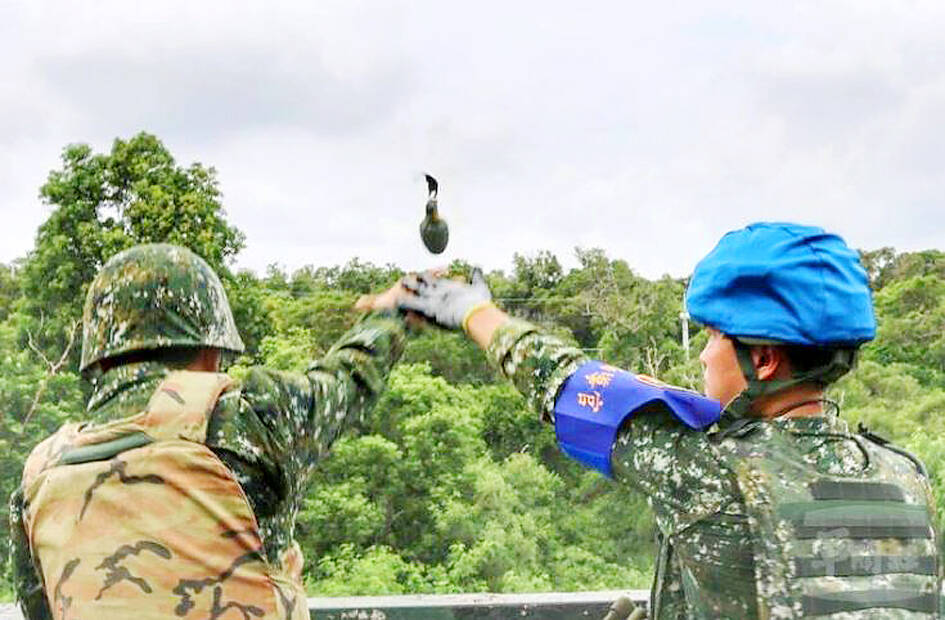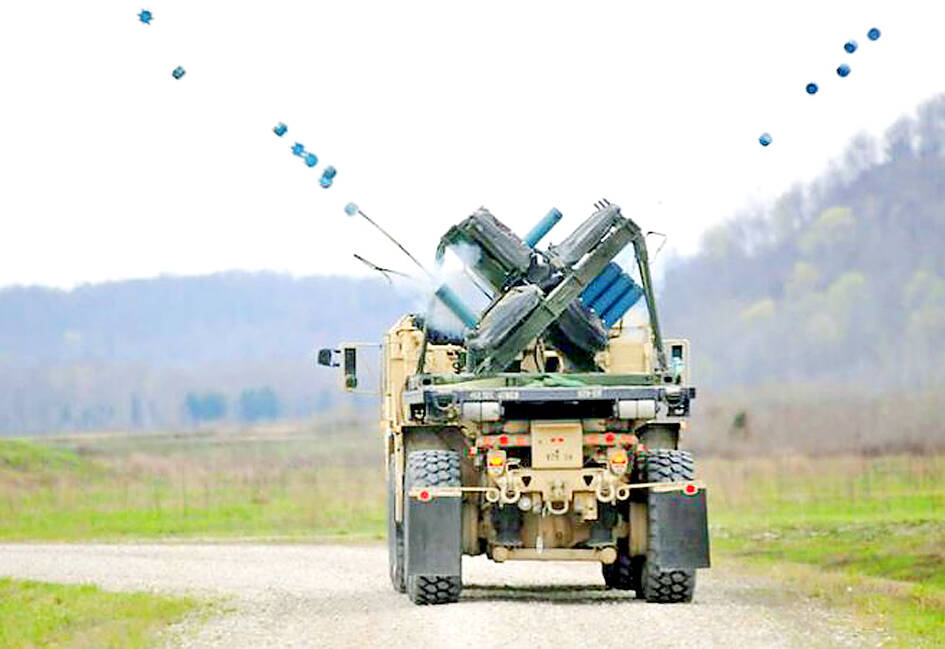The Ministry of National Defense plans to buy US-made M67 grenades worth NT$1.03 billion (US$32.3 million) over the next years as the military expands and tensions with China increase, the ministry’s budget showed.
The hand grenade program is to be allocated NT$51.8 million for the next fiscal year, according to the ministry’s budget proposal that was delivered to the Legislative Yuan on Thursday.
According to the US Department of Defense, the average cost of one M67 hand grenade was US$45 in 2021, meaning the ministry’s budget can afford about 730,000 grenades.

Photo courtesy of Military News Agency
The M67 grenades would supplement older Mk 2 grenades that were manufactured under license by the Chungshan Institute of Science and Technology, the budget showed.
The M67 is a design originating in the Vietnam War that features a more powerful explosive filler, a more reliable fuse and a smooth metal casing that produces deadlier fragments than previous designs.
Meanwhile, based on details of the ministry’s annual budget proposal for the next year, Taiwan is to receive seven of 14 anti-tank munition-laying systems that it had ordered from the US by the end of this year.

Photo: Screen grab from the US Army Reserve Web site
The remaining seven systems would arrive in 2026, it added.
The total budget for the M136 Volcano Vehicle-Launched Scatterable Mine System is about NT$4.89 billion, which is to be allocated through 2029, according to the ministry.
The budget would be slightly more than the NT$4.5 billion deal that Taiwan signed with Washington earlier this year.
The US arms package for Taiwan includes the M136 Volcano, M977A4 HEMTT 10-tonne cargo trucks on which munition-laying systems would be mounted, M87A1 Anti-Tank (AT) munitions, M88 canister training munitions (practice dummy ammunition rounds), and M89 training munitions (test ammunition rounds), according to a US Defense Security Cooperation Agency announcement made in December last year.
Procurement of the vehicle-launched automated mine dispensing systems has sparked concern from opposition parties and academics in Taiwan that they would turn the country into an “island of land mines.”
The Army Command Headquarters said on Friday that the acquisition of munition-laying systems would be crucial for deterrence and it is legal under domestic and international laws.
Mines would be used responsibly to accomplish military objectives while following humanitarian guidelines, the command said, adding that certain media outlets have acted “improperly” by using inflammatory language such as “island of land mines” to slander the military’s efforts to defend the nation.
Additional reporting by Wu Su-wei

The High Prosecutors’ Office yesterday withdrew an appeal against the acquittal of a former bank manager 22 years after his death, marking Taiwan’s first instance of prosecutors rendering posthumous justice to a wrongfully convicted defendant. Chu Ching-en (諸慶恩) — formerly a manager at the Taipei branch of BNP Paribas — was in 1999 accused by Weng Mao-chung (翁茂鍾), then-president of Chia Her Industrial Co, of forging a request for a fixed deposit of US$10 million by I-Hwa Industrial Co, a subsidiary of Chia Her, which was used as collateral. Chu was ruled not guilty in the first trial, but was found guilty

DEADLOCK: As the commission is unable to forum a quorum to review license renewal applications, the channel operators are not at fault and can air past their license date The National Communications Commission (NCC) yesterday said that the Public Television Service (PTS) and 36 other television and radio broadcasters could continue airing, despite the commission’s inability to meet a quorum to review their license renewal applications. The licenses of PTS and the other channels are set to expire between this month and June. The National Communications Commission Organization Act (國家通訊傳播委員會組織法) stipulates that the commission must meet the mandated quorum of four to hold a valid meeting. The seven-member commission currently has only three commissioners. “We have informed the channel operators of the progress we have made in reviewing their license renewal applications, and

Taiwan People’s Party (TPP) Chairman Huang Kuo-chang (黃國昌) yesterday appealed to the authorities to release former Taipei mayor Ko Wen-je (柯文哲) from pretrial detention amid conflicting reports about his health. The TPP at a news conference on Thursday said that Ko should be released to a hospital for treatment, adding that he has blood in his urine and had spells of pain and nausea followed by vomiting over the past three months. Hsieh Yen-yau (謝炎堯), a retired professor of internal medicine and Ko’s former teacher, said that Ko’s symptoms aligned with gallstones, kidney inflammation and potentially dangerous heart conditions. Ko, charged with

Taiwan-based publisher Li Yanhe (李延賀) has been sentenced to three years in prison, fined 50,000 yuan (US$6,890) in personal assets and deprived political rights for one year for “inciting secession” in China, China's Taiwan Affairs Office spokesman Chen Binhua (陳斌華) said today. The Shanghai First Intermediate People’s Court announced the verdict on Feb. 17, Chen said. The trial was conducted lawfully, and in an open and fair manner, he said, adding that the verdict has since come into legal effect. The defendant reportedly admitted guilt and would appeal within the statutory appeal period, he said, adding that the defendant and his family have